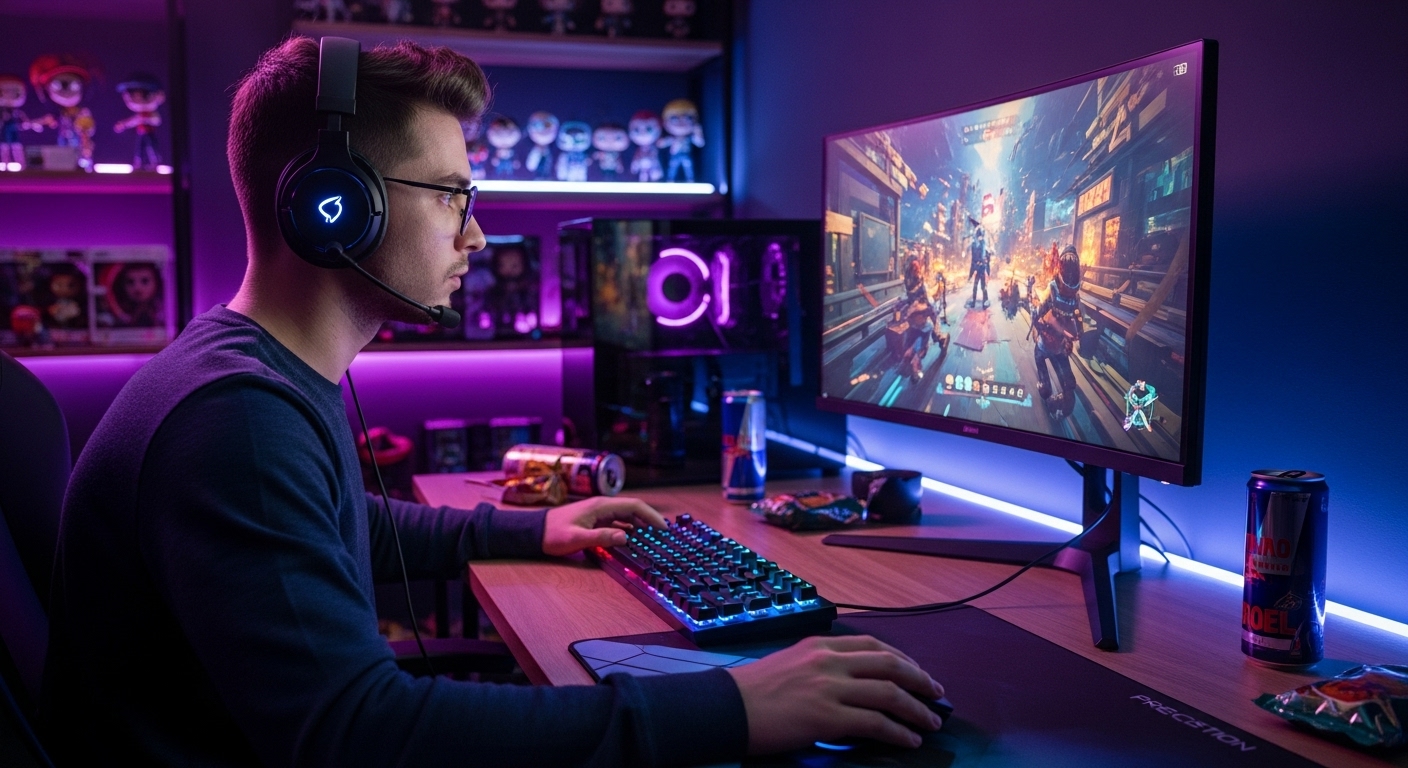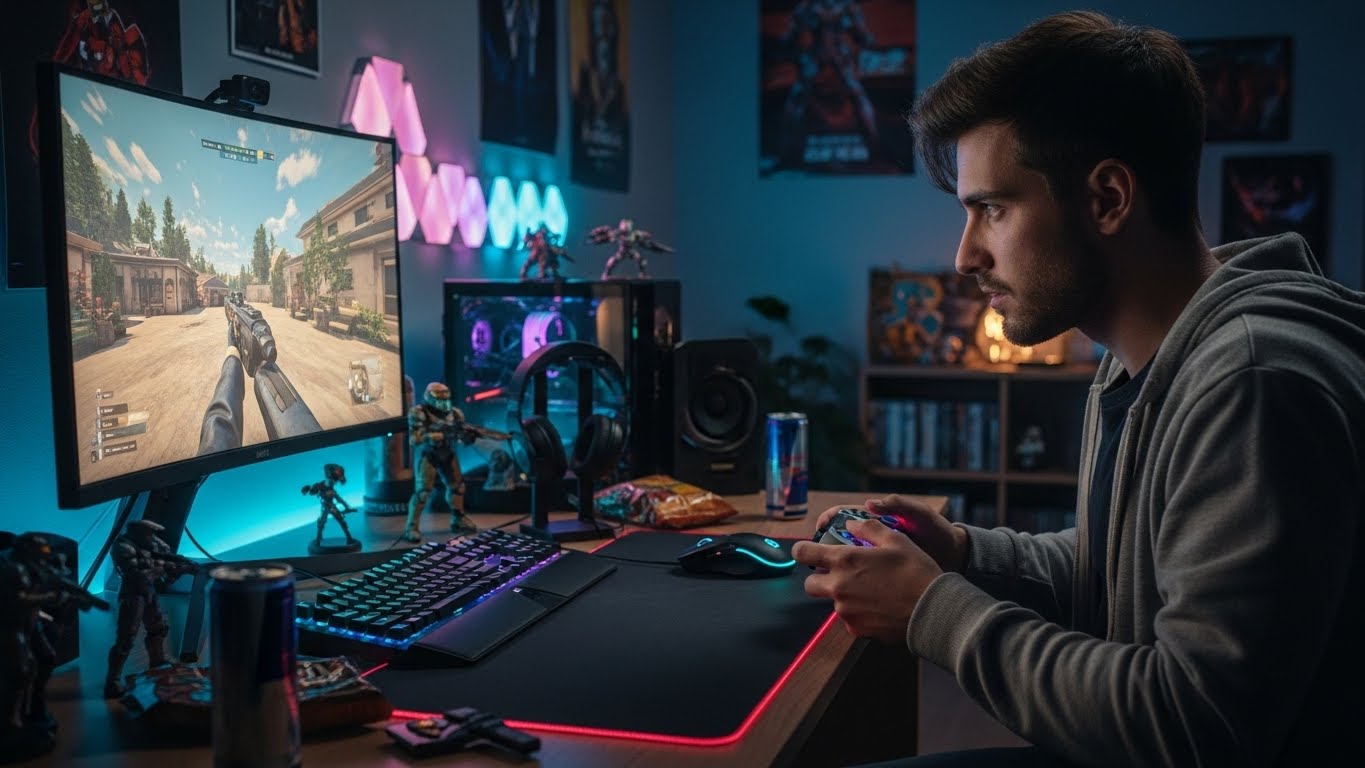Introduction: The Digital Playground of the Modern World
In the past, video games were often dismissed as child’s play or viewed as a distraction from the real world. Today, gaming stands as one of the most influential and profitable industries across the globe. With billions of players, professional competitions, massive streaming audiences, and intricate virtual economies, gaming is no longer just a hobby—it’s a dominant form of entertainment, culture, and even career.
From humble beginnings in arcades and pixelated home consoles to sprawling open-world adventures and virtual reality, the journey of gaming has been extraordinary. This blog explores the history, evolution, cultural impact, technological advancements, social aspects, and future of gaming in today’s digital age.
A Brief History of Gaming: From Pong to Powerful Platforms
The origins of video gaming date back to the early 1970s when games like Pong introduced the world to interactive electronic entertainment. Simple in design yet revolutionary in concept, these games laid the foundation for what would become a multibillion-dollar industry.
In the 1980s, the emergence of home consoles like the Atari 2600 and the Nintendo Entertainment System brought gaming into households. Characters like Mario and Donkey Kong became cultural icons, and game developers began pushing the boundaries of gameplay mechanics and storytelling.
The 1990s saw the rise of 3D graphics, CD-ROMs, and the first true competitive titles. Games like Doom, Quake, and StarCraft laid the groundwork for competitive multiplayer environments. This decade also introduced PlayStation and ushered in the idea of gaming as a serious industry.
By the early 2000s, online multiplayer, realistic graphics, and expansive open-world environments dominated. Games evolved from basic mechanics to complex narratives, rivaling films in storytelling quality. Today, gaming is more than just an activity—it is a lifestyle, a community, and a way to explore virtual worlds limited only by imagination.
The Gaming Industry Today: Bigger Than Movies and Music Combined
Gaming is now the most lucrative sector in entertainment. According to various market analytics, the global gaming industry generates more annual revenue than the film and music industries combined. This growth is fueled by digital distribution, microtransactions, mobile gaming, and the rise of live-service models.
Developers are not only creating games but also building ecosystems around them. Blockbuster franchises like Call of Duty, Fortnite, Minecraft, and Grand Theft Auto have millions of active users and deeply engaged communities. Gaming companies invest heavily in marketing, community support, and technological innovations to keep their players invested long after the initial purchase.
Gaming hardware has also evolved dramatically. High-end gaming PCs, powerful consoles, and handheld devices provide diverse options for players. Cloud gaming and game streaming services are now reshaping how games are accessed and played, offering players the ability to game from virtually anywhere.
The Art of Game Design: More Than Just Entertainment
Creating a successful video game is an art form involving storytelling, music, visual design, character development, level architecture, and mechanics. The most iconic games are not remembered solely for their graphics or difficulty but for how they made players feel.
Narrative-driven games like The Last of Us, Red Dead Redemption, and Life is Strange have shown that gaming can be emotionally powerful, touching on themes like loss, love, trauma, and redemption. These games blur the line between cinema and interactive storytelling, offering players choices that influence the outcome.
Indie developers have also made significant contributions. Without the massive budgets of AAA studios, indie games often focus on innovative mechanics and unique aesthetics. Titles like Hollow Knight, Celeste, and Stardew Valley have proven that passion and creativity can rival big-budget productions.
Gaming as Social Connection: Communities and Friendships
One of the most overlooked aspects of gaming is its power to bring people together. Online multiplayer games allow players to team up with friends or strangers across the world. These virtual spaces have become places where people socialize, collaborate, and form long-lasting friendships.
Games like Fortnite, Apex Legends, League of Legends, and Among Us are popular not just for their gameplay but for the social experiences they offer. Whether strategizing in battle or simply chatting in lobbies, gaming has become a modern-day social hub.
Streaming platforms such as Twitch and YouTube Gaming have also built communities around content creators. Viewers tune in not only for the gameplay but for the personalities, humor, and shared experiences. These creators often form tight-knit communities that blur the lines between fan and friend.
Gaming is also a refuge for individuals who may struggle with social anxiety or isolation. It provides a way to connect with others in a low-pressure, engaging environment where skills, cooperation, and communication are key.
The Rise of Esports: Professional Gaming Takes the Stage
What was once casual competition among friends has grown into a full-blown professional industry. Esports, or competitive video gaming, has exploded in popularity. Professional players compete in organized leagues for titles, prize pools, and sponsorships worth millions of dollars.
Games like Counter-Strike, Dota 2, Valorant, Overwatch, and League of Legends have thriving esports ecosystems. Major tournaments fill stadiums, while millions more watch live online.
Players train rigorously, just like athletes in traditional sports. They work with coaches, analysts, and psychologists to perfect their gameplay and manage stress. Careers in esports extend beyond players to include commentators, event organizers, graphic designers, and more.
Colleges and universities now offer esports scholarships and degree programs, while brands from traditional sports, fashion, and tech are investing heavily in esports as the next frontier of entertainment.
Gaming and Mental Health: A Double-Edged Sword
Gaming can offer significant mental health benefits. It provides escapism, stress relief, cognitive stimulation, and a sense of achievement. Games that focus on problem-solving, exploration, and creativity can enhance focus, memory, and emotional resilience.
However, excessive gaming or gaming addiction is a growing concern. It can lead to physical health issues, social withdrawal, and poor academic or professional performance. The World Health Organization officially recognized gaming disorder as a mental health condition, prompting more awareness and research.
Healthy gaming habits are essential. Game developers, educators, and parents must work together to promote balanced playtime and encourage breaks, physical activity, and social interaction outside the screen.
Representation and Diversity in Games
Diversity in gaming has become a crucial topic in recent years. Players from all backgrounds should feel seen and represented in the games they play. Developers are increasingly focusing on inclusive character design, accessible gameplay, and culturally sensitive storytelling.
Representation goes beyond race and gender. It includes the portrayal of different sexual orientations, disabilities, mental health conditions, and more. Games like Tell Me Why and Spider-Man: Miles Morales have taken important steps in inclusive storytelling.
Inclusion also extends to the gaming industry itself. Diverse voices in development, publishing, and marketing lead to richer and more authentic experiences. There is still much progress to be made, but the conversation around representation is louder and more impactful than ever.
The Impact of Gaming on Education and Learning
Gaming is not just for entertainment. Educational games and gamification techniques are increasingly used in classrooms and training environments to enhance engagement and retention. From teaching math and science to history and language skills, games are reshaping how people learn.
Simulations and serious games are also used in professional settings. Pilots, surgeons, and soldiers use games to practice in controlled, realistic environments without real-world consequences.
Game-based learning encourages critical thinking, collaboration, and creative problem-solving. As technology becomes more integrated with education, gaming is likely to play an even greater role in shaping future generations.
The Mobile Gaming Revolution
Mobile gaming has opened the doors of gaming to a broader audience than ever before. Smartphones have made games more accessible to people of all ages and backgrounds. Simple mechanics, free-to-play models, and short session lengths appeal to both casual and dedicated players.
Games like Clash of Clans, PUBG Mobile, and Genshin Impact have achieved massive success, blurring the line between console-level depth and mobile convenience.
Mobile gaming has democratized the medium, introducing billions to interactive entertainment without needing expensive hardware.
The Future of Gaming: What Comes Next?
The gaming world continues to evolve rapidly. Emerging technologies like virtual reality, augmented reality, and artificial intelligence are creating new forms of interaction and immersion.
Virtual reality allows players to step inside their favorite worlds. Augmented reality blends digital elements with the real world, as seen in games like Pokémon Go. AI is used to create smarter NPCs, realistic environments, and even generate dynamic storylines.
Cloud gaming services aim to eliminate the need for expensive hardware, letting players stream games on any device with an internet connection. This shift could revolutionize access to high-quality games worldwide.
As technology evolves, ethical questions will also rise. Issues such as data privacy, in-game purchases, and screen time regulation will demand thoughtful discussion and industry-wide standards.
Conclusion: Gaming as a Culture, Not Just a Pastime
Gaming has become a core part of modern life, shaping how we connect, learn, create, and compete. What started as simple pixelated adventures has evolved into immersive, emotional, and social experiences that rival any other form of entertainment.
Whether you’re a casual mobile gamer, a competitive esports player, a storytelling enthusiast, or someone who simply enjoys escaping into fantastical worlds, gaming offers something for everyone.



